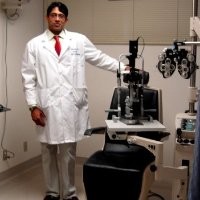Eye specialists at the National Institutes of Health (NIH) have made a breakthrough in developing eye drops that can potentially slow the progression of inherited diseases causing progressive vision loss. Retinitis pigmentosa, a group of such diseases, has been the key focus of this development. The eye drops contain a small fragment derived from a protein that the body naturally produces, known as pigment epithelium-derived factor (PEDF), which plays a crucial role in preserving the cells in the retina. This study has been published in Communications Medicine.
Patricia Becerra, Ph.D., the head of NIH’s Section on Protein Structure and Function at the National Eye Institute, and the senior author of the study, clarifies that while this isn’t a cure, it can help in slowing down the progression of several degenerative retinal diseases. This includes various types of retinitis pigmentosa and dry age-related macular degeneration (AMD). Given the positive results from the study, the team is now eager to move forward to human trials.
Degenerative retinal diseases have a common thread – cellular stress. Irrespective of the source, high levels of cellular stress can cause retinal cells to lose function gradually and eventually die. This ongoing loss of photoreceptor cells leads to vision loss and, in severe cases, blindness.
Previous studies from Becerra’s lab have shown that PEDF can help retinal cells withstand the effects of cellular stress. However, the full PEDF protein is too large to penetrate the outer eye tissues to reach the retina, making it impractical as a treatment. To tackle this, Becerra developed short peptides derived from a region of PEDF that supports cell viability. These small peptides can navigate through eye tissues to bind with PEDF receptor proteins on the retina’s surface.
In this new research, two eye drop formulations, each containing a short peptide, were developed. These peptides were applied to mice, and within an hour, they were found in high concentration in the retina, gradually decreasing over the next 24 to 48 hours. The peptides didn’t cause any toxicity or side effects.
When administered daily to young mice with a disease resembling retinitis pigmentosa, one of the peptides, H105A, slowed the degeneration of photoreceptors and vision loss. Mice that received this peptide through eye drops retained up to 75% of photoreceptors and continued to have strong retinal responses to light, whereas those given a placebo had little functional vision left by the end of the week.
In addition, the research team discovered that photoreceptors preserved through the eye drop treatment are healthy enough for gene therapy to work. This finding supports the potential of these PEDF-derived peptide eye drops to play a crucial role in preserving cells while waiting for gene-specific therapies to become clinically available.
To test the potential application in humans, the peptides were tested in a human retinal tissue model of retinal degeneration. The results showed that, with the peptides, the retinal tissues remained viable even under high levels of cellular stress.
This research, funded by multiple organizations, including the NEI Intramural Research Program and the Prevention of Blindness Society, marks a significant step forward in the treatment of degenerative retinal diseases.


Comments are closed for this post.